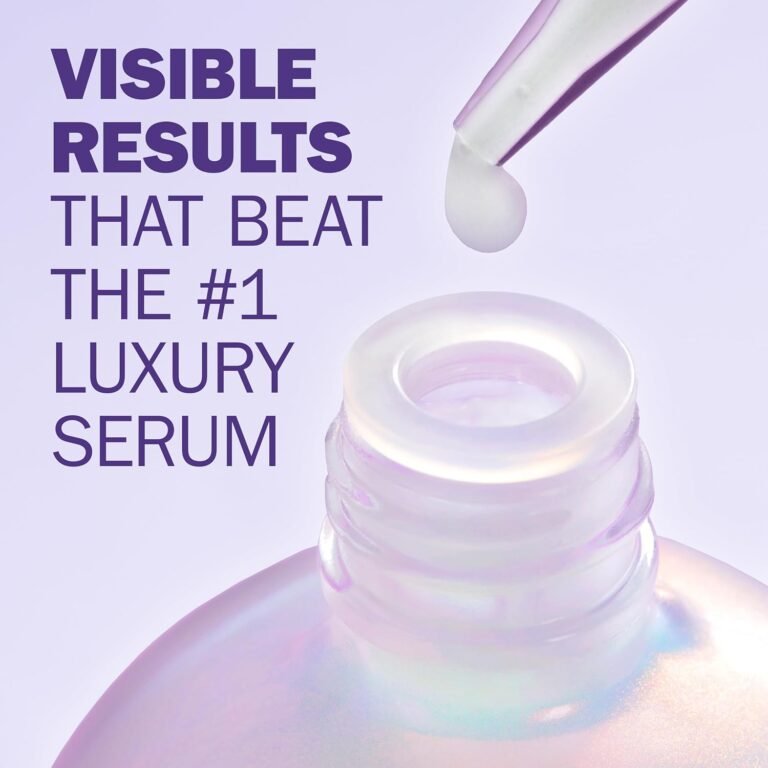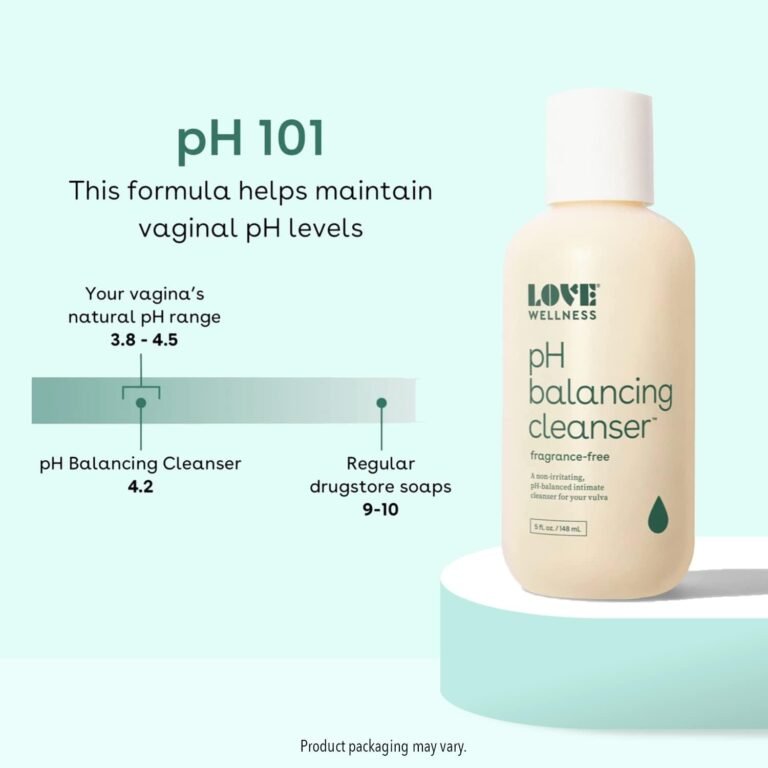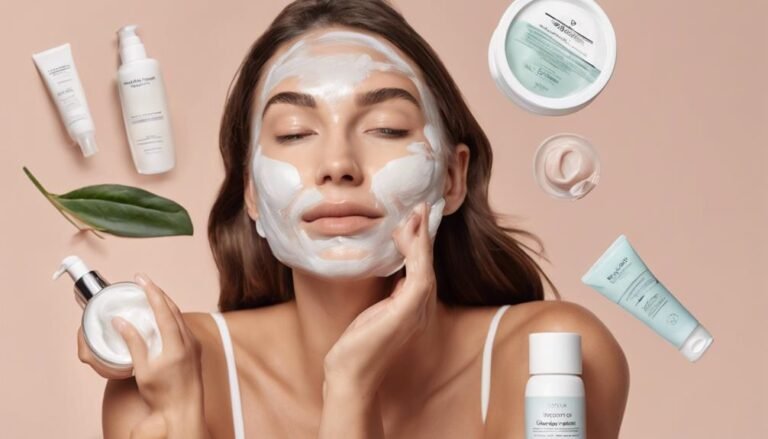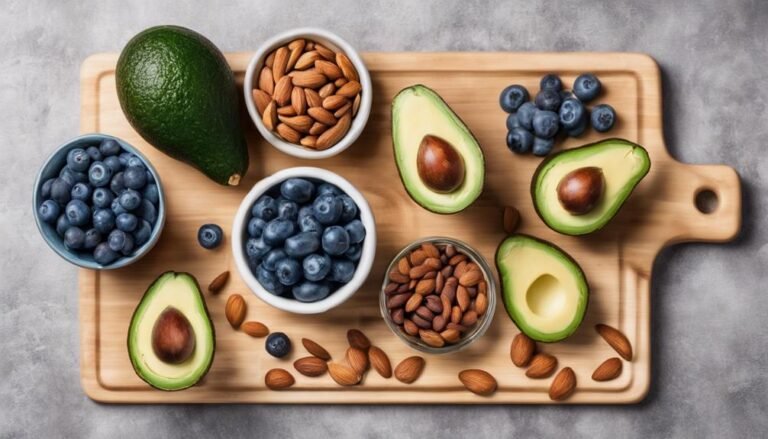Healthy Skin Through Proper Nutrition
You might be surprised to learn how much your diet can impact the health of your skin. By making simple changes to what you eat, you can nourish your skin from within and achieve a natural glow that no amount of skincare products can replicate. The connection between nutrition and skin health runs deep, and understanding how certain foods can either support or harm your skin's appearance is key to unlocking a radiant complexion. So, what exactly should you be putting on your plate to help your skin thrive? It all starts with the right choices at mealtime.
Key Takeaways
- Essential vitamins like A, C, and E aid skin repair and collagen production.
- Hydration from water-rich foods and skincare products maintains skin health.
- Antioxidants in berries and green tea protect skin from damage.
- Omega-3 fatty acids from fish and nuts keep skin hydrated and reduce inflammation.
- Avoid sugary, dairy, and processed foods for clearer skin.
Importance of Nutrient-Rich Foods
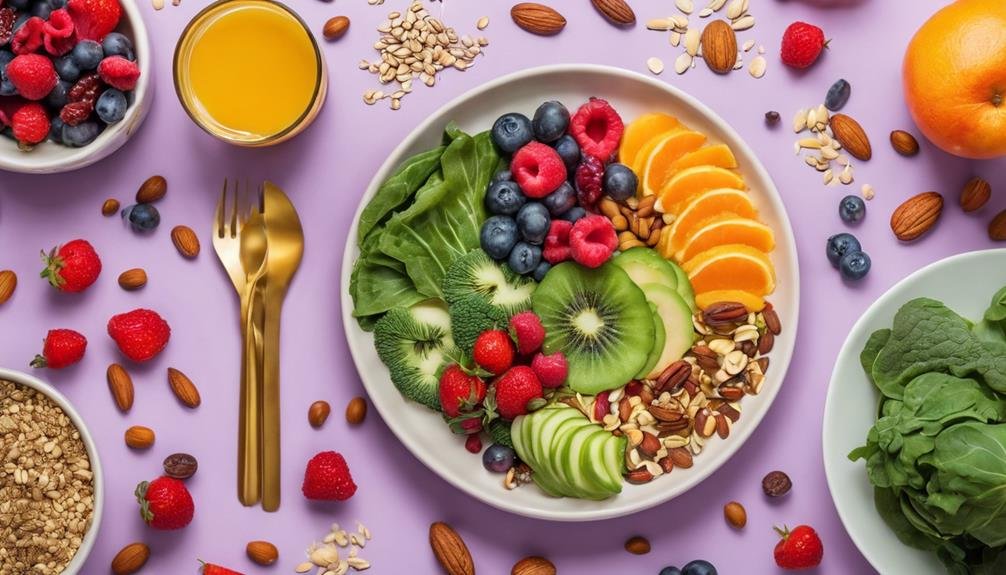
To maintain healthy skin, consuming nutrient-rich foods is paramount. Your skin's health is directly influenced by the nutrients you provide your body. Foods rich in vitamins A, C, E, and K, as well as minerals like zinc and selenium, play crucial roles in maintaining skin integrity.
Vitamin A aids in skin repair and maintenance, while vitamin C boosts collagen production, enhancing skin elasticity. Vitamin E acts as an antioxidant, protecting your skin from damage caused by free radicals. Vitamin K helps with blood clotting and can reduce the appearance of dark circles under your eyes.
Minerals like zinc promote skin healing and regulate oil production, while selenium protects against UV damage. Including a variety of fruits, vegetables, nuts, and seeds in your diet ensures you get a broad spectrum of nutrients necessary for healthy skin. Remember, what you eat directly impacts the health and appearance of your skin.
Hydration for Skin Health
Maintaining adequate hydration is a fundamental aspect of promoting skin health. Your skin is composed of cells that require water to function optimally. Dehydration can lead to dryness, flakiness, and even exacerbate skin conditions like eczema. When you don't drink enough water, your skin can appear dull, tight, and more prone to wrinkles. It's crucial to hydrate not just through water intake but also by consuming water-rich foods such as fruits and vegetables. These foods provide hydration while also delivering essential vitamins and minerals that support skin health.
Aim to drink at least eight glasses of water a day to keep your skin hydrated from the inside out. Additionally, incorporating hydrating skincare products into your routine can help lock in moisture and improve skin elasticity.
Essential Vitamins for Skin

Proper nutrition plays a crucial role in maintaining healthy skin, with essential vitamins being key components in promoting skin health. Vitamins are essential micronutrients that play a vital role in supporting various skin functions.
Here are three essential vitamins for skin health:
- Vitamin A: Known for its role in skin cell production and repair, Vitamin A helps maintain smooth and radiant skin by promoting cell turnover and supporting the skin's natural barrier function.
- Vitamin C: A powerful antioxidant, Vitamin C helps protect the skin from damage caused by free radicals and UV exposure. It also aids in collagen production, promoting skin elasticity and firmness.
- Vitamin E: Another antioxidant, Vitamin E helps protect the skin from oxidative stress, keeping it looking youthful and healthy. It also supports skin hydration and helps in the healing process of damaged skin.
Ensuring an adequate intake of these essential vitamins through a balanced diet can contribute significantly to achieving and maintaining healthy, glowing skin.
Antioxidants and Skin Protection
Ensuring your skin's protection against environmental stressors and premature aging is crucial, and antioxidants play a significant role in this process. Antioxidants are molecules that help neutralize free radicals in the body, which are unstable atoms that can damage cells and contribute to aging and various skin issues. By incorporating antioxidant-rich foods like berries, green tea, and dark chocolate into your diet, you can help combat oxidative stress and support skin health.
Vitamin C, vitamin E, and beta-carotene are powerful antioxidants known for their skin-protective properties. Vitamin C aids in collagen production, promoting skin elasticity and reducing the appearance of wrinkles.
Vitamin E helps protect the skin from sun damage and supports skin repair. Beta-carotene, found in colorful fruits and vegetables, can help improve skin tone and protect against UV damage.
Including a variety of antioxidant-rich foods in your daily meals can aid in maintaining healthy, youthful skin and shielding it from external aggressors. Remember, a balanced diet rich in antioxidants is key to nurturing your skin from the inside out.
Omega-3 Fatty Acids Benefits
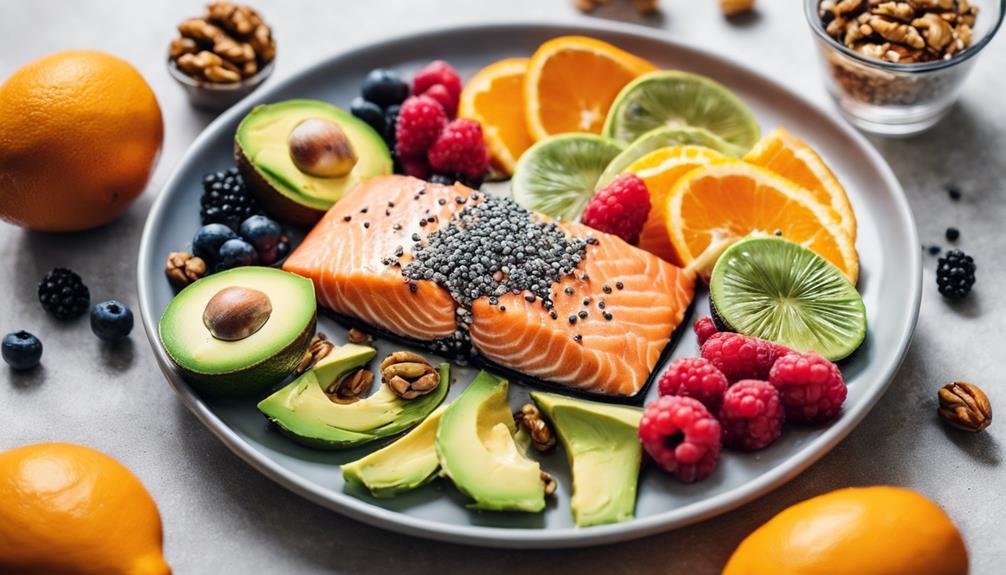
How do omega-3 fatty acids benefit your skin health and overall well-being? Omega-3 fatty acids play a crucial role in maintaining healthy skin and promoting overall well-being. These essential fats aren't produced by the body, so it's important to incorporate them into your diet for optimal health.
- Moisture Retention: Omega-3 fatty acids help to maintain skin hydration by supporting the skin barrier function, reducing dryness and preventing moisture loss.
- Reduced Inflammation: These fats have anti-inflammatory properties that can help to calm skin conditions like acne, eczema, and psoriasis, promoting clear and healthy skin.
- Protection from UV Damage: Omega-3 fatty acids have been shown to provide some level of protection against sun damage, reducing the effects of UV rays on the skin and helping to prevent premature aging.
Incorporating sources of omega-3 fatty acids such as fatty fish, flaxseeds, chia seeds, and walnuts into your diet can contribute to healthier skin and overall well-being.
Impact of Sugar on Skin
Research indicates that the impact of sugar on skin health is significant, with excess sugar consumption being linked to various skin issues. When you consume high amounts of sugar, it can lead to increased inflammation in the body, which can manifest on your skin as acne, rosacea, or eczema flare-ups. Sugar also triggers a process called glycation, where sugar molecules bind to collagen and elastin fibers, causing them to become stiff and less flexible. This results in premature aging signs like wrinkles and sagging skin.
Moreover, high sugar intake can spike your insulin levels, leading to increased sebum production. Excess sebum can clog pores and result in acne breakouts. To support healthy skin, aim to reduce your intake of sugary foods and beverages.
Opt for whole fruits instead of sugary snacks and try to limit processed foods that are high in added sugars. By making these dietary adjustments, you can promote clearer, more youthful-looking skin.
Protein for Skin Repair
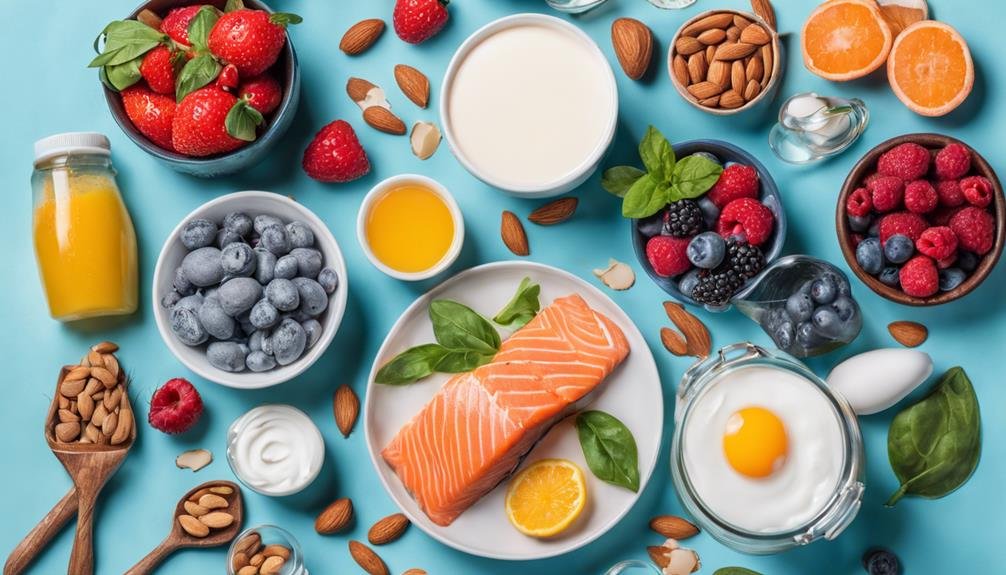
The impact of sugar on skin health underscores the importance of being mindful of your dietary choices for maintaining healthy skin. When it comes to skin repair, protein plays a crucial role in supporting the regeneration and rejuvenation processes. Adequate protein intake provides the necessary building blocks for repairing damaged skin cells and tissues.
Here are three key reasons why protein is essential for skin repair:
- Collagen Synthesis: Protein-rich foods contain amino acids that are vital for the production of collagen, a protein that helps maintain skin elasticity and firmness.
- Wound Healing: Proteins aid in the formation of new skin tissue, accelerating the healing of wounds, cuts, and scars.
- Antioxidant Defense: Certain proteins possess antioxidant properties that protect the skin from oxidative stress and damage caused by free radicals.
Healthy Fats for Skin Elasticity
Enhancing skin elasticity is a key aspect of maintaining healthy and youthful-looking skin. Including healthy fats in your diet can significantly contribute to this goal. Omega-3 and omega-6 fatty acids are essential for skin health as they help maintain the skin's lipid barrier, which is crucial for moisture retention and overall skin elasticity.
Omega-3 fatty acids, found in fatty fish like salmon and flaxseeds, possess anti-inflammatory properties that can help reduce skin redness and irritation, ultimately enhancing skin elasticity.
On the other hand, omega-6 fatty acids, present in sources like nuts and seeds, aid in skin cell regeneration and maintenance of the skin's structure.
Foods to Avoid for Clear Skin

To promote clear and healthy skin, it's essential to be mindful of the foods you consume. Certain foods can aggravate skin conditions and lead to breakouts. Here are three types of foods to avoid for clear skin:
- Sugary Foods: Foods high in sugar can spike your blood sugar levels, leading to increased oil production in the skin and potential acne breakouts.
- Dairy Products: Dairy products contain hormones that may contribute to inflammation and clogged pores, exacerbating acne and other skin conditions.
- Processed Foods: Processed foods often contain high levels of unhealthy fats, artificial ingredients, and preservatives, all of which can negatively impact skin health by increasing inflammation and reducing skin elasticity.
Gut Health and Skin Connection
To understand the complex relationship between gut health and skin condition, it's important to recognize the profound impact your digestive system can have on the health and appearance of your skin. Your gut is home to trillions of bacteria that play a crucial role in maintaining your overall well-being, including the health of your skin. When the balance of bacteria in your gut is disrupted, it can lead to inflammation and various skin issues such as acne, eczema, and psoriasis.
The gut-skin axis is a bidirectional relationship, meaning that imbalances in your gut can manifest as skin problems, and conversely, skin issues can also indicate underlying gut problems.
Taking care of your gut health through a balanced diet rich in fiber, fermented foods, and prebiotics can promote a healthy microbiome, which in turn may improve the appearance and vitality of your skin.
Superfoods for Skin Glow
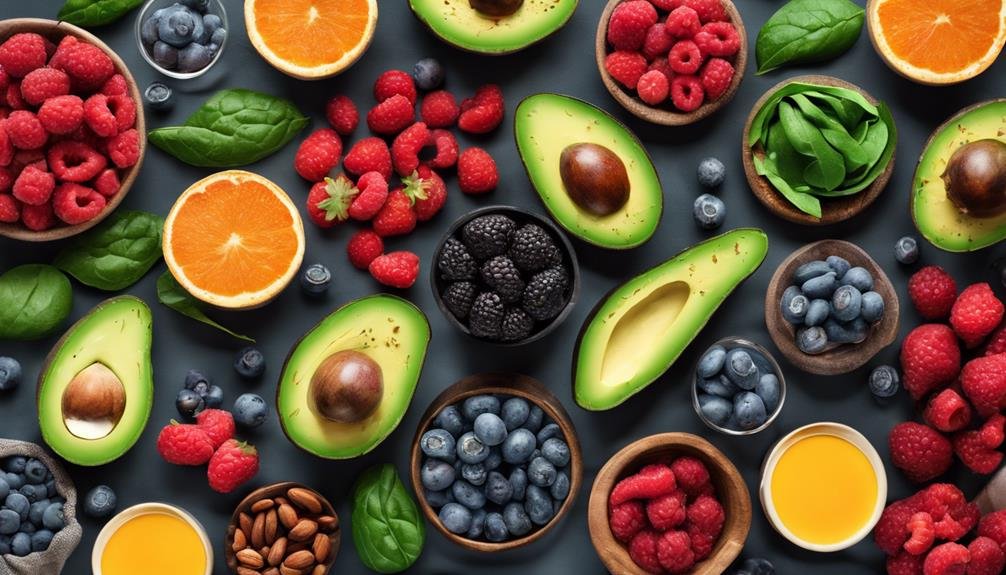
You can boost your skin's radiance and health by incorporating superfoods into your diet. These nutrient-packed foods can provide your skin with the necessary vitamins and antioxidants to maintain a healthy glow. Here are some superfoods that can help improve your skin's appearance:
- Berries: Packed with antioxidants, such as vitamin C and polyphenols, berries help protect your skin from damage caused by free radicals. Blueberries, strawberries, and raspberries are excellent choices.
- Fatty Fish: Rich in omega-3 fatty acids, fish like salmon, mackerel, and sardines can help reduce inflammation in the skin and keep it moisturized, leading to a more radiant complexion.
- Avocado: This creamy fruit is high in healthy fats and vitamin E, which can help nourish your skin from the inside out. Avocados also contain antioxidants that may protect your skin from sun damage and aging.
Incorporating these superfoods into your diet can contribute to healthier, glowing skin.
Meal Ideas for Healthy Skin
Eating a well-balanced diet rich in nutrients is essential for maintaining healthy skin. Including specific foods in your meals can help nourish your skin from the inside out. Here are some meal ideas packed with skin-loving nutrients:
| Meal | Components |
|---|---|
| Breakfast | Greek yogurt with berries and nuts |
| Whole grain toast with avocado and smoked salmon | |
| Lunch | Quinoa salad with spinach, tomatoes, and feta |
| Grilled chicken with sweet potato and asparagus | |
| Dinner | Baked salmon with quinoa and roasted vegetables |
| Lentil soup with kale and a side of mixed greens |
These meals provide a balance of essential vitamins, minerals, and antioxidants that support skin health. Remember to hydrate well and incorporate a variety of colorful fruits and vegetables to maximize the benefits for your skin. By making these meal choices, you are not only fueling your body but also promoting a radiant and healthy complexion.
Frequently Asked Questions
Can Stress Affect Skin Health?
Yes, stress can significantly impact skin health. When you experience stress, your body releases cortisol, a hormone that can trigger inflammation and lead to various skin issues like acne, eczema, and premature aging. Prioritize stress management for healthier skin.
How Does Caffeine Impact Skin?
Like a double-edged sword, caffeine can both energize and dehydrate your skin. It constricts blood vessels, leading to a dull complexion. However, moderate intake can offer antioxidants. Balance is key for skin health.
Is Organic Food Better for Skin?
Organic food can benefit your skin by providing essential nutrients and antioxidants. These can help protect against skin damage and promote a healthy complexion. Choosing organic options may reduce exposure to harmful chemicals often found in non-organic produce.
Does Lack of Sleep Affect Skin?
Not getting enough sleep can affect your skin by causing a decrease in collagen production, leading to dullness and fine lines. Additionally, lack of sleep can result in increased inflammation and breakouts, impacting your skin's overall health.
Can Food Allergies Trigger Skin Issues?
Yes, food allergies can trigger skin issues. When your body reacts to certain foods, it can manifest as skin problems like hives, eczema, or dermatitis. It's essential to identify and avoid allergens to maintain healthy skin.
Conclusion
In conclusion, maintaining healthy skin through proper nutrition is crucial for overall skin health. Did you know that approximately 85% of people experience skin issues due to poor diet and lack of essential nutrients? By incorporating nutrient-rich foods, staying hydrated, and avoiding inflammatory foods, you can nourish your skin from the inside out. Remember, what you eat directly impacts the health and appearance of your skin. Start making healthier choices today for glowing, radiant skin.




